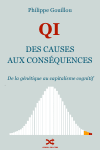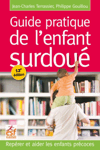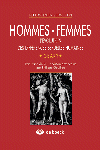Etude
Le 21 avril 2014, Scott Barry Kaufman a analysé dans son blog hébergé sur Scientific American les corrélations entre le QI et 45 critères de personnalité à partir de l'échantillon de The Eugene-Springfield Community (Goldberg, 2008). Il note :
J'ai analysé les données de l'échantillon Eugene-Springfield community, qui comprend 478 participants quasiment tous blancs vivant à Eugene and Springfield, en Oregon (USA). Les participants allaient de 20 à 85 ans, et couvraient tous les niveaux d'éducation. L'échantillon comprenait 199 hommes et 279 femmes. Quoique l'échantillon ne présente pas de diversité ethnique, il offre une assez bonne représentatitivité des QI et personnalités, ce qui permet d'obtenir une assez bonne vision de comment le QI est lié à la personnalité dans la population générale.
Kaufman, 20141
Résultats
Sur les 45 critères de personnalités étudiés :
- 21 montraient un p < 0,05 et 10 un p < 0,01
- Les critères correspondant à l'Ouverture à l'expérience (Openness) étaient les plus corrélés et l'étaient positivement
- Leadership et Bonheur étaient positivement corrélés (p < 0,05)
- Moralité et Sensibilité étaient négativement corrélés (p < 0,01)
Kaufman détaille tous les résultats en fin de son article. J'ai repris les chiffres des 21 critères corrélés à p < 0,05 (donc incluant ceux avec p < 0,01) pour réaliser le graphique reproduit ci-dessus : cliquez sur l'image pour l'agrandir ou cliquez ici pour afficher les mêmes résultats en histogramme.
Remarques personnelles
Les corrélations sont remarquablement faibles : seulement 21 critères sur les 45 étudiés sont significatifs, et parmi ceux-ci :
- Seuls l'Engagement intellectuel et la Créativité intellectuelle dépassent 0,4
- La Rapidité mentale est à moins de 0,35
- La Compétence intellectuelle est à moins de 0,30
-...
Les résultats de Kaufman apparaissent ainsi rester compatible avec l'approche de Christopher Brand2 qui proposait de considérer le QI comme un sixième axe de personnalité pour créer le "Big Six" à partir du Big Five.
Philippe Gouillou
6 mai 2016
Chiffres du graphique
Les 45 résultats (incluants les 21 significatifs utilisés pour les graphiques) sont téléchargeables en format CSV : iq-personality-source.csv
Les 21 significatifs sont (* : p < 0,05 ; ** : p < 0,01_) :
| Critère | Corrélation |
|---|---|
| Engagement intellectuel** | 0,423 |
| Créativité intellectuelle** | 0,414 |
| Rapidité mentale** | 0,342 |
| Compétence intellectuelle** | 0,270 |
| Introspection** | 0,241 |
| Organisation** | 0,207 |
| Ingénuité** | 0,200 |
| Force mentale** | 0,200 |
| Profondeur intellectuelle** | 0,191 |
| Imagination** | 0,180 |
| Provocateur** | 0,151 |
| Leadership* | 0,119 |
| Bonheur* | 0,116 |
| Auto-divulgation* | 0,112 |
| Stabilité émotionnelle* | 0,104 |
| Modération* | 0,097 |
| Sociabilité* | -0,098 |
| Moralité** | -0,131 |
| Sensibilité** | -0,166 |
| Ordonné** | -0,180 |
| Nurturance** | -0,193 |
Sources
Kaufman, S. B. (2014). How Does IQ Relate to Personality? Beautiful Minds - Scientific American, (April 21 2014).
Goldberg, L. R. (2008). The Eugene-Springfield Community Sample: Information Available from the Research Participants. Oregon Research Institute (ORI) Technical Report (Vol. 48). [PDF]
Pozzebon, J. A., Visser, B. A., Ashton, M. C., Lee, K., & Goldberg, L. R. (2010). Psychometric Characteristics of a Public-Domain Self-Report Measure of Vocational Interests: The Oregon Vocational Interest Scales. Journal of Personality Assessment, 92(2), 168–174. doi:10.1080/00223890903510431
Historique des versions
| Date | Description |
|---|---|
| 7 mai 16 | Ajout des chiffres et du graphique en format histogramme |
| 6 mai 16 | 1ère mise en ligne |
Notes
-
Traduction depuis
I analyzed data from the Eugene-Springfield community sample, which consisted of 478 mostly White participants from Eugene and Springfield, Oregon. Participants ranged in age from 20 to 85 years, and spanned all levels of educational attainment. The sample consisted of 199 males and 279 females. While the sample isn't ethnically diverse, it does have a pretty good range of IQ and personality, so we can get some sense of how IQ relates to personality in the general population. The IQ test that participants took consisted of 15 multiple-choice items that measured knowledge and abstract reasoning.
Kaufman, 2014 -
Téléchargez gratuitement son livre The g Factor (Christopher Brand) sur ce site ↩




















